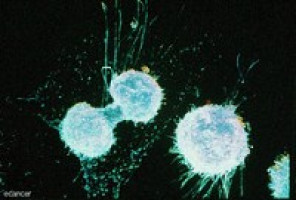
New drugs that activate the immune system to target cancer cells have improved the lives of many patients with cancer.
However, immunotherapies are not effective in all patients, and the success of these therapies depends on individual patient factors.
A team of Moffitt Cancer Center researchers is trying to find new ways to further enhance the activity of the immune system against cancer.
In an article published in the January issue of Cancer Cell, the researchers describe how a new type of immunotherapy drug targeting the protein TIM-3 works to stimulate the immune system.
Many of the currently approved immunotherapy drugs target a type of immune cell called a T cell.
Once activated, T cells can home in on a tumour and target it for destruction.
Despite many successes with these drugs, some patients many not respond as well to these immunotherapies as others.
Moffitt researchers wanted to determine if it would be possible to activate the cancer-fighting properties of T cells indirectly by targeting another type of immune cell called a dendritic cell.
The researchers performed a series of experiments with breast cancer samples and mouse models of breast cancer.
They discovered that a protein called TIM-3 is found on dendritic cells in breast tumours.
TIM-3 is known to play a critical role in regulating the immune system, suggesting that it may be possible to target TIM-3 on dendritic cells in order to activate T cells.
They confirmed this by showing that tumour growth was reduced in mice treated with an antibody drug that targets TIM-3 and the chemotherapy agent paclitaxel, as compared to treatment with paclitaxel alone.
The researchers next wanted to determine how the TIM-3 antibody works to activate the immune system.
They discovered that treatment with the TIM-3 antibody causes dendritic cells to produce chemical messengers which subsequently activate T cells, thereby resulting in an immune-mediated response against tumour cells.
Several drugs that target TIM-3 are currently being studied in early stage clinical trials in different tumour types, including breast cancer.
The results from the Moffitt study suggest that TIM-3-targeting drugs may effectively launch an immune response against cancer cells, particularly when combined with paclitaxel in breast cancer patients.
"Paclitaxel is one of the preferred chemotherapies for use in breast cancer, and our findings indicate that anti-TIM-3 antibodies currently in clinical development should also be considered in this setting as a means to improve upon the immune-dependent response to chemotherapy," explained Brian Ruffell, Ph.D., assistant member of Moffitt's Department of Immunology.